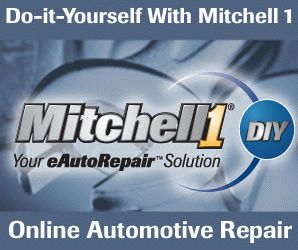Proper Care And Feeding Of Your Tires.
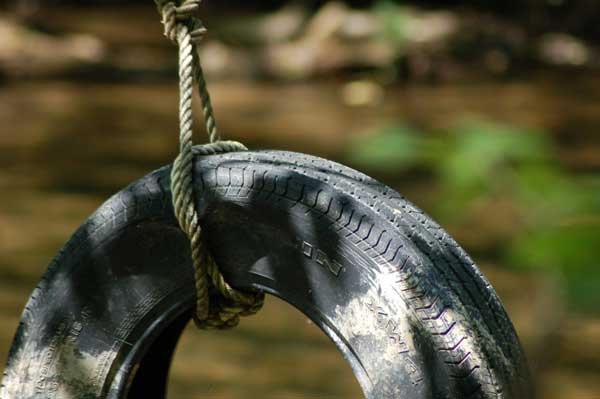 Your tires are the critical connection between your car and the road. They affect acceleration, braking and even ride quality. So it’s no wonder that tire care should be a top priority as a car owner. Let’s look at some of the key steps in getting the longest life and safest miles from your tires…
Your tires are the critical connection between your car and the road. They affect acceleration, braking and even ride quality. So it’s no wonder that tire care should be a top priority as a car owner. Let’s look at some of the key steps in getting the longest life and safest miles from your tires…
Tire Care – Proper Inflation
We have all heard it before; properly inflated tires will allow you to achieve the highest MPG. It will also improve the life of your tires and can affect the ride quality as well. Under inflated tires will run hotter due to increased friction. This heat lowers gas mileage, wears the tire from the inside out, and can lead to poor handling and uneven wear on the outside of the tread. Over inflated tires will have a harsh ride, less traction and will wear unevenly at the center of the tread pattern.
What is the proper inflation pressure for your tires? Check inside your door jamb for a manufacturer’s sticker with recommended inflation pressures. Your owners manual will also explain the recommended range of pressures to run. All tires will have a Max. Pressure molded in to the tire, don’t be confused, this is not the pressure you should be running the tires at! Always follow the auto manufacturer’s recommendation for your vehicle to ensure proper tire care.
Rotation
Your car will never be 100% perfectly aligned, thus your tires will never wear evenly. Rotation allows for you to even the wear between front and rear tires over time and get the longest life from your tires. Typically front tires will wear more unevenly than the rears, due to independent front suspension and the fact that the front tires are turning when cornering. Tire rotation every 5-6,000 miles is the norm, and will allow you or your mechanic to inspect the tires and see how they are wearing. Any uneven wear can tip you off to an alignment or tire pressure issue.
What Are Those Green Caps On My Valve Stems?
In the past 10 years, more and more tire installers have switched from filling your tires with air, to nitrogen. Why Nitrogen? Its molecules are larger which leads to less leakage and since Nitrogen is a dry gas, there is no moisture to help corrosion of your wheels from the inside. It also is an inert gas, and contains no oxygen so even less worries about wheel corrosion. It does however still suffer from pressure changes in fall/winter months just like air, so when the winter rolls around, make sure to check your tire pressures.
Posted: 13th April 2014 | Author: Kevin Schappell | Category: Wheels and Tires
Why it matters who fixes your car
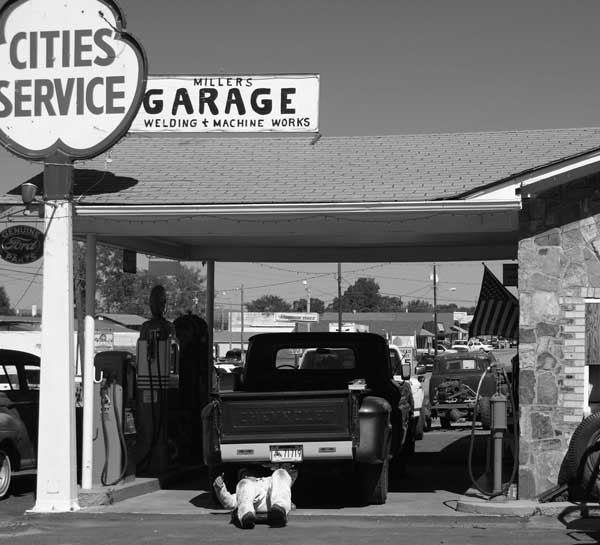 When it comes to the expense of owning a car, maintenance and repairs can rack up a lion’s share of the costs. Who you have doing work on your car or truck can make or break you in the end. Let’s look at the three types of mechanics and where you are likely to get the best service.
When it comes to the expense of owning a car, maintenance and repairs can rack up a lion’s share of the costs. Who you have doing work on your car or truck can make or break you in the end. Let’s look at the three types of mechanics and where you are likely to get the best service.
New Car Dealer Mechanic
You bought a new car and it comes with a warranty, so you naturally take it back to the dealer you bought it from for service. Is that the best way? In most cases, yes! The dealership has the most up-to-date repair information, technical service bulletins and direct connection for warranty service issues.
But what to do when you are not happy about the level of service you are receiving or the additional charges that are racked up on routine services from your mechanic? First step is to complain to the service manager, then his boss, then move it up to the corporate level. You can also look to find another dealership in your area and try them. If you buy a Honda, there is no reason you have to have it serviced by the same dealership you bought it from, try Joe’s Honda in the next town to get the service you expect.
Independent Mechanic
The independent mechanic is going high-tech and many have the same repair information the dealers have, but getting repairs covered under warranty may be a little tougher. But, if you can find an independent mechanic who you trust and has the skills, you will save money over using a dealership for service. Oil changes, brake jobs and even minor engine work can often be done for way less money that the dealership charges.
One thing to consider if your car is under warranty; Save all receipts for proof that preventative maintenance was done at factory intervals. This record keeping is essential when it comes to getting warranty claims paid. It’s also the reason why I recommend dealership service first provide you are happy with their service and pricing. When your service is done at a dealership where the warranty is also held, then the record keeping is handled by the dealer and no worries for you.
Chain L.O.F. Shops (Lube Oil & Filter)
We have all seen the oil change specials advertised at these nationwide chains. While some of these shops are run well by owners who really care about their customers, others are simply franchises with owners who really know nothing about automotive service. Their employees are lower paid, and while that does not always mean poor service, it begs the question… “Would you want the same kid flipping your hamburgers to be changing your oil?”
I see these shops as a last ditch option, when emergency service has to be done, or if you know the owner or mechanic and can trust them to do minor service like oil changes or tire rotation. The price may be right, but the end result may leave you paying in the end.
Posted: 11th April 2014 | Author: Kevin Schappell | Category: General
Brake Service, What You Need To Know
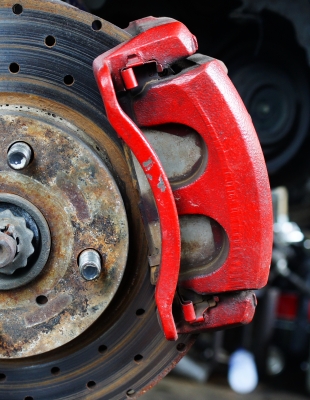 As a car owner, getting your brakes serviced is a part of ownership, but do you know if you are getting the best service? Let’s start with common reasons you may find yourself at a mechanic for brake service…
As a car owner, getting your brakes serviced is a part of ownership, but do you know if you are getting the best service? Let’s start with common reasons you may find yourself at a mechanic for brake service…
Brake Noises:
Most issues with brakes start with a noise. Most brake pads are designed to make noise when they come close to the end of their useful life. They have a thin metal warning tab which vibrates when it touches the brake rotor. This is entirely normal and serves as a signal to you the driver to get them serviced soon.
Brake dust build-up can also cause squeaking but it’s usually intermittent. If your brake pads have been changed lately and the squeaking has started, I would suspect brake dust.
Grinding Noises:
Grinding noises are usually the brake pad backing material grinding in to the rotor. Brake pads are made of a steel backing plate with friction material being bonded or riveted to it. As the friction material wears away the rivets or the actual backing plate can contact the rotor. Any grinding noise should be cause for an immediate trip to the mechanic.
The Shakes:
You step on the brakes and you are met with a shimmy and a shake from the steering wheel, what to do? The brake rotor can warp over time, and can cause the front wheels to shake slightly. While a minor shake is ok, and can come and go, if it’s too much poor steering and stopping distances can result. Most brake rotors today are made thin enough, that the rotor cannot be turned, or resurfaced, so replacement is usually the way to go.
Now that you have the basics down, how about getting the best deal on a brake job?
Where to go for brake service?
If your car is under warranty and you have a good relationship with them, by all means go there. Independent garages are a good option if you can find a good one you trust, as the costs will be slightly lower. Franchise brake and oil change shops should be your last resort. I always recommend asking friends for recommendations, and of course check online for reviews.
Pad Choices?
Brake pads are all about the friction material, the harder they are, the longer they last. But with anything in life, there is a tradeoff. Harder brake pads will wear down the rotor faster and may produce more heat making warping a possibility. Most places will advertise lifetime brake jobs, and install hard metallic pads to prolong the life at the expense of your rotors. I recommend going with a name brand organic brake pad or a semi-metallic. You may end up changing brake pads more, but will have to replace rotors less frequently as well.
What to look for in a brake job?
Always insist on an estimate before work is done, ask to see the worn parts before any work is done and if you are not able to see the parts, ask that they save them for you to view when picking up your car. Never be afraid to ask questions, a good shop appreciates an educated customer. Also ask that your wheels be torqued with a torque wrench and not an impact wrench and “torque sticks” which may or may not provide uniform torque if not used correctly. Uneven torque can lead to warped rotors which will just have you back at the shop spending more money.
Posted: 9th April 2014 | Author: Kevin Schappell | Category: Brakes
Autobody Repair – What You Need To Know
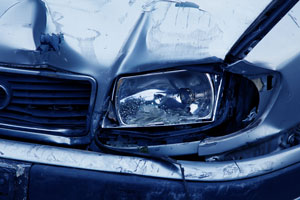 It’s a fact of car ownership; you will be involved in an accident or parking lot incident that will lead you to a body shop for paint repair. Being an educated consumer is the best way to assure you get the best service and your car leaves better than new!
It’s a fact of car ownership; you will be involved in an accident or parking lot incident that will lead you to a body shop for paint repair. Being an educated consumer is the best way to assure you get the best service and your car leaves better than new!
How to find a body shop?
Most insurance companies will have a list of recommended shops in your area. If insurance is covering the bill, ask them if they have a preferred shop. Most shops use the same estimation software and quotes usually vary very little between shops but it cannot hurt to get 2 – 3 quotes to make sure you are getting the best deal.
If you are paying for the entire repair and insurance is not involved, shop around. Many shops turn down non-insurance work, because quite frankly they get paid more when dealing with an insurance company. Insurance companies have a book of rates which they pay for each type of damage and it’s usually a higher payout than if you were to pay out of pocket. The same scenario plays out with health insurance too, paying cash usually results in a lower bill for the job at hand.
The quote.
Make sure the person estimating the work has all the information at hand. They should know how the accident happened, and any other issues the car has had after the accident. If the impact was hard enough problems with the engine, suspension or transmission could pop up and the estimator should know this to get an accurate quote.
What to expect when taking your car to a body shop…
First remove all valuables from the interior of the car, and any extra stuff in the trunk. I am not too concerned about theft, but body work is dusty, and your valuables may come back to you with a coating of dust or overspray. Most minor body work can be completed in 2 – 3 days so if you don’t have alternative transportation, get a rental car. Your insurance company or the auto body shop can often help you arrange for a rental car and have it waiting for you when you drop off the car.
Picking up your car at the autobody shop.
ALWAYS inspect the work. Look at the repaired area in a well-lit area, preferably in the shop if it’s raining outside or dark. Look for overspray, dry areas where the clear coat was not applied well, and any sanding marks which may not have been gotten out before final paint. You or your insurance company is paying a lot for the repair, so make sure you are happy with it!
Also pay attention to the body shops recommendations for “after care”. Modern paints and paint booths leave a durable finish, but often times washing and waxing your car should only be done after 30 days when the paint is fully cured. Following these tips, your car should be as good as new, and when it comes time to resell, or trade-in, your investment will be protected.
Posted: 7th April 2014 | Author: Kevin Schappell | Category: Body
Winter Car Care Tips
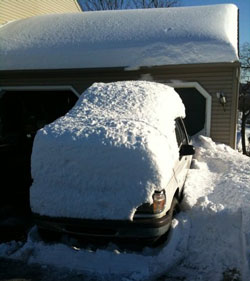 As the temperature drops and you get the shovels ready, have you thought about your car? It needs attention too, and by being prepared you can assure a safe winter driving season.
As the temperature drops and you get the shovels ready, have you thought about your car? It needs attention too, and by being prepared you can assure a safe winter driving season.
Check Your Coolant!
The most important thing to do, since the damage can be so expensive, is to check your engine’s coolant. Engine coolant or anti-freeze is designed to keep your engine cool all year round but when the temperature drops it must also keep from freezing. Anti-freeze is usually a mixture of distilled water and propylene glycol and can protect from freezing way below 0 degrees F. Have your mechanic check the freezing point using a refractometer and top off the level prior to winter’s chill.
Is Your Battery In Tip-Top Shape?
Batteries have a typical lifespan of 3 – 5 years depending on brand, construction and environment. Cold weather puts stress on a car battery and will reduce the rated output making cold weather starts tough. If your battery is over 4 years old, I suggest getting it checked with a load meter, and consider replacement if you are in a cold weather climate for safety sake. Having the terminals cleaned, and cables checked is also a good idea going in to the winter months.
Air Up Those Tires.
As the air outside cools down, so does the air in your tires. Tires can lose 3 – 5 PSI when the temperature drops. Also check out the tread, and consider a good set of winter tires to help plow through the winter months.
Are You Prepared?
A good emergency kit is vital for winter driving. Make sure to have jumper cables, first aid kit, a warm blanket and some ice melt to help you out of slippery situations. A collapsible shovel and a tow rope are optional, but recommended if you do a lot of winter driving on rural roads.
Last But Not Least…
Have a good coat of wax on your car! A fresh coat of wax before the winter season will help protect your car’s paint from the harsh salt and chemicals used by road crews. Regular car washing and cleaning of the undercarriage will assure your car stays rust free and operating properly. Click here to schedule a convenient mobile car wash and detailing today.
Posted: 7th January 2014 | Author: Kevin Schappell | Category: General
